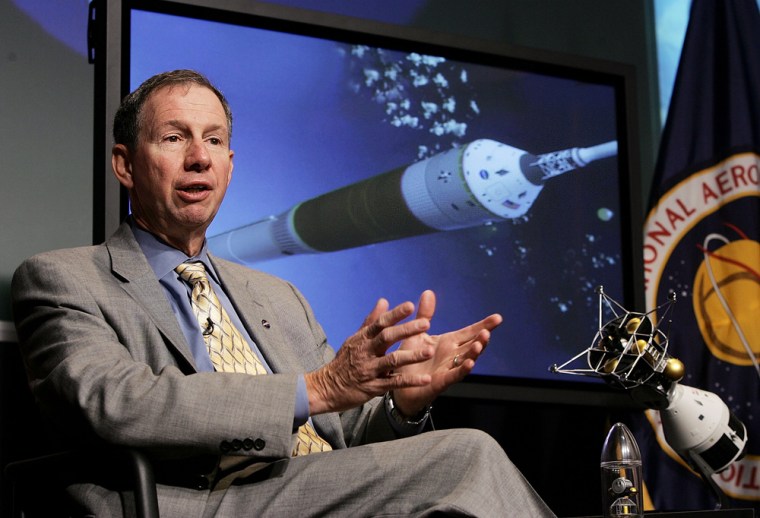NASA Administrator Michael Griffin warned astronomers Tuesday that funds for their programs will be tighter than they have been in the past decade as NASA focuses more on human space missions.
"The growth of science within NASA has been in the 5 to 7 percent range, annualized over the last decade or so, and that's been great," Griffin told members of the American Astronomical Society. "We're in a budget environment right now when that level of growth can't be maintained, although science at NASA will still have growth. But we are all hurting."
Astronomers have voiced persistent concerns that the Bush administration's vision for space exploration — which calls for human missions to the moon and eventually Mars — unduly concentrates on human exploration to the detriment of robotic space missions.
Roughly two-thirds of NASA's $16.4 billion budget for fiscal 2006 goes to support the space shuttle, the international space station and the development of a new system to get people into space. Space science programs will be getting about $5.4 billion this year, compared with $5.5 billion in 2005.
Griffin noted scientists' concerns and told the thousands of astronomers gathered for an annual meeting that NASA doesn't want to "sacrifice present-day scientific efforts for the sake of future benefits to be derived from exploration."
He said improved technology, commercial involvement and international cooperation might help cut costs for the human space exploration program, leaving more money for science.
Saving Hubble
Griffin, an engineer and rocket scientist, has had a long relationship with NASA and an open affection for scientific programs there, long before he took the top job last year. This has been evident in his commitment to trying to keep the aging Hubble Space Telescope working.
He cut off applause from astronomers after he said NASA planned to send shuttle astronauts to the orbiting telescope, which has needed an upgrade for two years.
"Thanks, but we still need to figure out if that's possible," Griffin said of the shuttle repair flight.
Only one space shuttle mission has flown since the Columbia disaster that killed seven astronauts on Feb. 1, 2003. After an exhaustive investigation, experts determined that falling foam insulation had damaged the craft on launch, dooming it to disintegrate on re-entry.
The same problem with falling foam recurred on a shuttle mission last summer, and Griffin has said there must be another test flight before any Hubble repair can be undertaken. The next shuttle launch is tentatively set for May.
A robotic repair mission for Hubble has been explored and dismissed, Griffin said.
"It is either a shuttle mission to repair Hubble, or it will not be repaired," he said.
Answering questions
Fielding questions submitted in advance by astronomers, Griffin said the astronomical community should set its own priorities for research, given the limited money available.
However, he defended the administration's emphasis on human exploration.
"I would argue strongly with those who assert that human spaceflight is inimical to science," Griffin said. "It is my conviction that in the 21st century we will see human civilization spread out into the solar system, carrying with it the values we collectively cherish, including the value and practice of free and open inquiry which is so essential to the scientific community."
